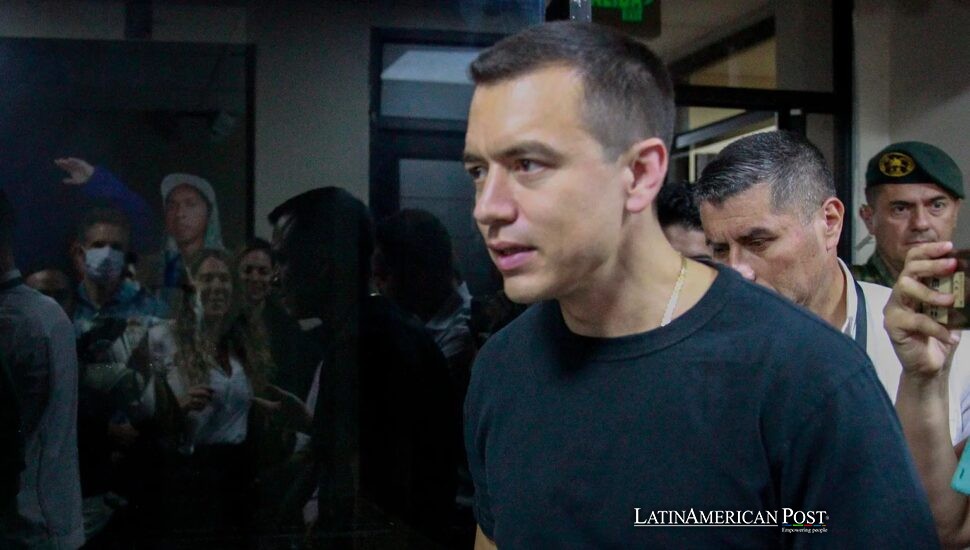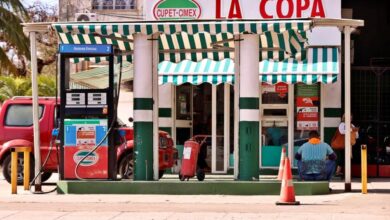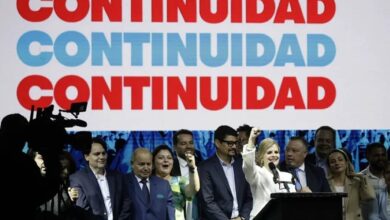Ecuador’s Constitutional Crisis Pits Security Against the Soul of Its Democracy

In Quito, a president marches against his court, judges face threats, and a nation watches its constitution tested in real time—between fear of violence, hunger for order, and the quiet, brittle strength of democratic restraint.
A Presidential March, and a Nation on Edge
On a weekday that felt anything but routine, Ecuador’s president, Daniel Noboa, took to the streets—not just as a politician, but as a protester. Walking at the front of a crowd that surged toward the Constitutional Court, Noboa made clear that this was no ordinary disagreement over policy. Placards showed the faces of nine magistrates, each accused of “stealing peace” from the public. Behind the slogans was a deeper tension: the fear that Ecuador’s spiraling violence might break more than bodies—it might shatter the very boundaries of governance.
The confrontation was triggered by the Court’s decision to temporarily suspend parts of three emergency laws Noboa sees as critical to his anti-crime agenda. As the country weathers one of its bloodiest years—over 4,600 homicides in just six months—the court’s caution landed like a slap. But if the president sees delay, others see defense.
Political analyst Santiago Basabe warned the public spectacle was dangerous theater. “Targeting the judges this way is an act of political misery,” he told EFE. International reaction came swiftly. The United Nations’ human rights chief, Volker Türk, called the images of magistrates on protest posters “unacceptable.” Amnesty International echoed the alarm, insisting that Ecuador’s courts must operate without political pressure.
What unfolded wasn’t just a clash between branches of government. It was a question of what Ecuadorians are being asked to choose between: safety or the system meant to protect their rights.
Security, Speed, and the Price of Shortcuts
From the moment he took office last November, and again after his April re-election, Noboa has governed with urgency. Cartels, prison mafias, and street gangs have made fear part of daily life. In response, the president declared an “internal armed conflict,” militarized public life, and used emergency powers to pass law after law.
Among those fast-tracked were three measures: an Intelligence Law, a Solidarity Law, and a Public Integrity Law. But on August 4, the Constitutional Court hit pause—freezing 17 articles it said violated key civil liberties. These included powers for warrantless surveillance, the ability to pardon military officers under investigation, and broad state access to personal data.
To government supporters, the court was gutting a hard-won strategy, finally cracking down on organized crime. To human rights defenders, it was a necessary intervention. Basabe, speaking to EFE, argued the measures, frozen or not, wouldn’t solve Ecuador’s more profound crisis. “Dismantling gangs,” he said, “requires intelligence, institutional reform, and long-term prosecution—not shortcuts.”
The court is staking its authority on a delicate line: allowing the fight against crime, but refusing to let that fight write its own rules unchecked.
The Court, the Critics, and the Weight of Neutrality
Over the past two years, Ecuador’s Constitutional Court has quietly become the only real counterweight to an increasingly muscular presidency. And now it is paying the price.
Defense Minister Gian Carlo Loffredo did not mince words. “The court has done nothing but be a nuisance,” he said, his frustration captured by EFE. Behind the rhetoric is a more profound concern: that restraint, in this moment, is being painted as sabotage.
There is precedent for this standoff. Noboa has already flouted court orders, from ignoring directives about transferring presidential power to bypassing rulings on emergency states. The court’s warnings may be constitutional, but they are not always obeyed.
That makes the current showdown feel not just legal, but cultural. If judicial oversight is reframed as betrayal, the country drifts toward something colder. The Indigenous movement and the leftist correísta bloc—two groups often at odds—have both condemned what they see as an attempt to intimidate the judiciary. Their politics differ. Their warning does not.
In a democracy under pressure, courts are meant to say “no” when the state says “now.” If the price of that role becomes personal threat or public vilification, the system starts to erode not with a bang, but with a march.
A Referendum That Could Rewrite the Rules
The courtroom isn’t the only front in this war of ideas. Noboa has submitted four referendum questions to the same court now under fire—questions that, if approved, would go to voters on December 14. One would ask the public: Should judges of the Constitutional Court be subject to political impeachment?
To some, it sounds like accountability. To others, it is open season on judicial independence.
Meanwhile, the National Assembly has requested to delay a hearing on the very law—Public Integrity—that helped trigger the current crisis. The judiciary, legislature, and executive now move in uneasy orbit, each step tangled with the others.
“We’re in a pause,” political analyst José Javier Orellana told EFE. But it’s not peace. Behind closed doors, he said, talks are likely underway “at the highest level.” What comes next may determine the shape of Ecuador’s democracy long after the latest crime wave fades.
For now, Noboa portrays the court as a safety obstacle. The court insists it’s a guardian of rights. The people want both. And the December referendum may become the stage where that contradiction is tested—and possibly resolved.
Holding the Line Between Power and the Constitution
The stakes aren’t abstract. Ecuador is bleeding—literally and politically. Crime has metastasized. Prisons have become war zones. Civilians are afraid. And yet, in the name of fighting fear, the country now risks redrawing its rulebook.
Noboa, armed with a clear mandate, believes the moment requires legal tools to match the threat. The court, in turn, believes its job is to make sure those tools do not bend the Constitution past breaking.
The Assembly stands somewhere in between, pulled by urgency and legality, unsure of how to balance speed with oversight. And on the streets, ordinary Ecuadorians try to square their lived fear with the slower work of institutions that ask for patience.
Also Read: Panama and Colombia Turn Global Rivalry into Ports, Pipelines, and Possibility
The images from Noboa’s march still linger: a president calling out judges by name, a crowd angry enough to cheer. But the question ahead isn’t just whether the court folds or the president charges forward. It’s whether Ecuador can defend its democracy while defending its citizens—and whether leaders can resist the pull to rewrite the system instead of rebuilding trust within it.
The verdict isn’t in yet. But the clock is ticking.





